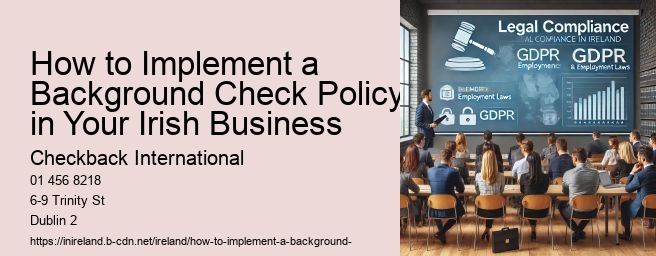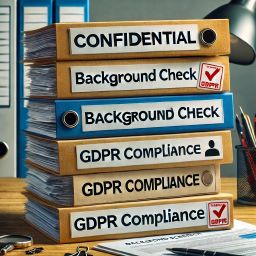

During this process, the agency checks the candidate's information against multiple national and international databases.
Importance of Compliance in Employee Screening Maintaining legal standards during employee screening is a regulatory requirement in Ireland and a key part of reliable hiring practices. When performing background checks in Ireland, organizations must follow the General Data Protection Regulation (GDPR) and the Data Protection Acts.
3.The company conducts compliance reviews with the Central Bank and other regulatory bodies to maintain standards.
Data analytics tools and Artificial Intelligence increase the accuracy of candidate information verification and help predict worker performance.
Organizations face significant penalties for breaking data protection regulations, making privacy standards a key part of the vetting process.
Companies perform specific background checks for remote workers, which include both standard and remote-specific verifications.
The system takes 5-10 working days to process checks, supporting quick hiring while following security industry rules and data protection laws.
Data Protection and Privacy Considerations
Specialized airside vetting services follow strict security protocols and specific compliance measures. Sanctions and Watchlist Check Checkback's expertise in Airside Pass and Known Consignor vetting provides complete screening processes that meet BS7858 security standards.

The normal processing period for vetting in Ireland takes 21 days, though this can reduce to about 10 days in certain situations. The speed depends on how quickly and openly clients submit required documentation.
People should collect key documents like CVs, educational certificates, and references. This groundwork helps maintain accuracy and speeds up the verification process. Background checks need direct permission, as these reviews check potential employees' histories, including criminal records.
4.Ignoring Candidate Concerns: Respond to queries from candidates promptly to maintain transparency and trust.


This process helps create safer workplaces and reduces hiring risks. The checks also support companies in meeting P.S.A. Tenant Screening standards and other industry requirements, making them valuable for Irish businesses.
Candidates must submit proof of identity, address verification, and statutory declarations for gaps in employment history. The process also requires financial and medical declarations, plus screening against international criminal records.
Pre-employment vetting in Ireland covers screening processes, from European Criminal Record Checks to consumer credit assessments and specialized airside security clearances.
Pre-employment vetting in Ireland combines local and European standards for workplace security and regulatory compliance. The process includes criminal record checks, credit assessments, and credential verification, allowing organizations to screen potential employees while following data protection laws. This method adapts to meet industry requirements and regulatory frameworks.
Companies use this report to make decisions about hiring candidates for security-sensitive positions.
The verification process typically takes up to 21 days, though it can be completed in as little as 10 days when candidates and previous employers provide timely responses.

4.Diverse Sources: Information gathered from Courts, Companies Office, credit agencies, and European inspectorates.
Though candidates may choose not to participate in screening, companies need to verify potential employees' backgrounds, particularly for regulated industries or positions needing security clearance.
The European Criminal Record Check (ECRC) is a verification tool used by Checkback for Irish organizations hiring from across the EU.

A background check in Ireland involves reviewing a person's criminal, financial, or personal records to assess their suitability for a role or position.
The duration can vary but typically takes between 1-2 weeks, depending on the type and complexity of the check.
Garda vetting is a specific type of background check required in Ireland for individuals working with children or vulnerable adults, involving checks against police records.
Yes, you must obtain consent from the individual before conducting any background checks in Ireland.
Not for all employees, but certain sectors such as healthcare and education may require comprehensive checks.
It includes checking for any criminal convictions or offences recorded against the individual.
Yes, individuals can request their own background checks in Ireland for personal review or to prepare for employment screenings.
Skipping background checks can lead to hiring unsuitable candidates, which may result in legal and reputational risks.
Yes, police clearance is a general criminal record check, while Garda vetting is specific to roles involving vulnerable groups and includes more detailed investigations.
You can request transcripts or degrees directly from educational institutions or use third-party services that specialize in educational verifications.
Information about spent convictions, certain types of personal data, and other protected characteristics under GDPR is off-limits unless specifically relevant and lawful to access.
International checks may involve additional complexities such as different laws, languages, and longer processing times.
No, background checks do not affect your credit score as they do not involve a credit inquiry that would impact the score.
Best practices include securing data in compliance with GDPR, limiting access to authorized personnel, and ensuring data is stored for only as long as necessary.
It depends on the industry and role, but typically every 2-3 years or when significant changes occur in the individual’s role or responsibility.
While not specific by law, many IT positions require checks due to access to sensitive or proprietary information.
GDPR regulates the processing of personal data, ensuring that background checks are conducted in a lawful, fair, and transparent manner.
Yes, but it must be done lawfully and with the individual’s consent, considering the relevance to the role.
Penalties can include fines, legal actions, and reputational damage, depending on the severity of the non-compliance.
Remote work has increased the importance of thorough background checks, especially for those in positions of trust or handling sensitive data.
Best practices include conducting similar checks as for permanent staff, especially if they have access to sensitive or critical areas.
Ensuring fairness involves following consistent procedures, obtaining consent, and allowing candidates to dispute inaccuracies.
Yes, it’s recommended to tailor background checks based on the specific risks and requirements of each position.
Signs include transparency about services, compliance with legal standards, positive reviews, and strong data protection practices.
Handling involves assessing the relevance to the job, discussing findings with the candidate, and considering legal and ethical implications.